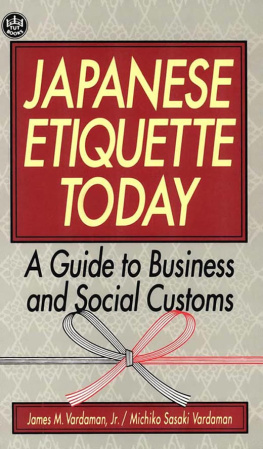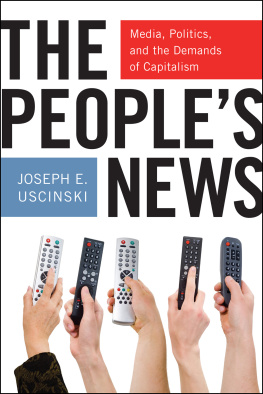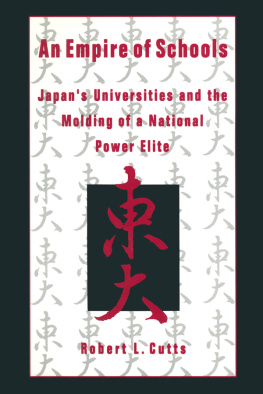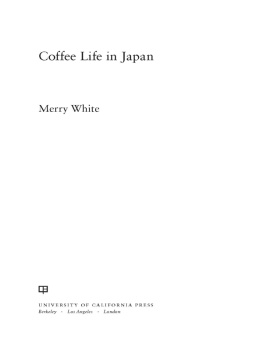Copyright 2000 by Princeton University Press
Published by Princeton University Press, 41 William Street,
Princeton, New Jersey 08540
In the United Kingdom: Princeton University Press,
Chichester, West Sussex
All Rights Reserved
Library of Congress Cataloging-in-Publication Data
Freeman, Laurie Anne, 1957
Closing the shop : information cartels and Japan's mass media / by Laurie Anne Freeman.
p. cm.
Includes bibliographical references and index.
ISBN 0-691-05954-3 (cloth : alk. paper)
1. Mass mediaPolitical aspectsJapan. 2. Press and politicsJapan. 3. Mass mediaCensorshipJapan. I. Title.
P95.82.J3F74 2000
302.23'0952dc21 99-31737 CIP
This book has been composed in Galliard
The paper used in this publication meets the minimum requirements of ANSI/NISO Z39.48-1992 (R1997) (Permanence of Paper)
http://pup.princeton.edu
Printed in the United States of America
10 9 8 7 6 5 4 3 2 1
Preface
WHEN A RESEARCHER embarks on field research, perhaps no question looms larger than the theoretical significance of the project at hand. So it was when I began to study Japan's ubiquitous and institutionally distinctive press clubs (kisha kurabu). Are these institutional anomalies of interest only because they are precisely that, anomalies, or do they play a larger role in the framing and presentation of important political and social issues and the way such issues are understood by society and elites in Japan? In short, are Japan's kisha clubs merely functional equivalents of newsgathering and news-dissemination routines found in other advanced industrial democracies, or do they have a substantively different impact on the way reality is socially constructed in Japan and the functioning of Japanese democracy?
Keeping these questions in the back of my mind, I felt that, as one of the first systematic attempts to analyze Japanese press institutions and the linkages among press, state, and society in Japan, the project was intrinsically an important one. I was pleased, nonetheless, when I was invited by Asahi shimbun, perhaps Japan's most prestigious newspaper, to observe the press clubs in the Liberal Democratic party (LDP) headquarters, the Diet, and the prime minister's office. My hope was to be able to gain a better understanding of the role the press clubs play in the flow of information from elites to society by observing them firsthand. I did not expect the experience to be the revelation it soon proved to be.
The way in which I gained access to the clubs was itself instructive, and it serves as a telling introductory example of the kinds of relationships that exist between journalists and politicians in Japan. While my sponsors at Asahi had gained permission from the members of a number of important political clubs for me to act as a participant observer, they found themselves in a bit of a dilemma when it came to gaining my entry to the prime minister's office, the Diet, and LDP headquarters, and therefore to the clubs housed inside these organizations. These institutions can only be accessed by presenting official identification cards or badges, but participant observership of a kisha club is not a category recognized by state bureaucrats in charge of issuing them. The solution the Asahi political journalists devised in order to get me past the guards and reception areas and into the clubs was as ingenious as it was illuminating. The process was actually quite simple, requiring only what the Japanese refer to as kone, a term derived from the English word connection, here a close, personal relationship.
In this case, one of my Asahi sponsors contacted a politician in the LDP with whom he had developed close relations earlier in his career, asking whether the Diet member would mind signing me on as one of his personal political secretaries. Since the Diet member in question had not yet filled his allotment and, as a freshman politician, was unlikely to do so, he agreed to the arrangement even though he benefited in no direct way, as I was to be his secretary in name only. Shortly after I was introduced to the Diet member I obtained the coveted identification badge allowing me free entry to and exit from the prime minister's official residence compound, the Japanese Diet, and LDP headquarters. Though I have always thought it curious that there appeared no other way to get me in, I was thankful to the journalist who had no doubt either cashed in on a debt the politician owed him or taken on a debt of his own in order to get me into the clubs.
Within a month of gaining entry, I was witness to an event that was even more significant in shaping my understanding of the relationship between media and political elites in Japan and the role the press clubs play in that relationship. The story of what happened in the spring of 1990 is worth telling here, albeit in brief.
In May 1990, several weeks before South Korean President Roh Tae Woo was to make an official visit to Japan, the Japanese press began to write a flurry of articles, the central focus of which was the possible wording of the speech (okotoba) that the emperor was to make during an official reception honoring the Korean president. Each news organization tried frantically to outscoop its competitors by being the first to publish the actual text of that speech. As the Ministry of Foreign Affairs, the Liberal Democratic party, and the Imperial Household Agency were themselves at odds over how Japan should respond, a considerable amount of leaking of what was purported to be the actual text of the speech went on, resulting in somewhat conflicting news reports.
Things came to a head on the morning of May 15, however, just ten days before Roh was to arrive in Japan. On that day, every major Japanese newspaper carried a front-page headline referring to the now famous dogeza hatsugen (prostration comment) that they uniformly attributed to one of the heads of the Liberal Democratic party (jimint shun). The media commonly use this phrase when they decide not directly to attribute a statement; the initiated know that it refers to one of only three individuals: the prime minister, the party secretary general, or the chief cabinet secretary. The remark read in part, it is because we have reflected on the past that we cooperate with Korea economically. Is it really necessary to grovel on our hands and knees and prostrate ourselves any more than we already have?
Although the Japanese media had neglected to attribute the story, the Korean media soon began to report that it had been Ozawa Ichiro, at that time the powerful secretary general of the LDP (and subsequently the main strategist behind Prime Minister Hosokawa, the first non-LDP prime minister in almost four decades), who had made the statement. The following day, during a meeting with top LDP and government officials, Ozawa apologized for having allowed the problem to escalate, and later that day he met with South Korean ambassador to Japan, Lee Won Kyung, to apologize directly. Japanese newspaper reports of these two meetings were written in such a way that it was never made clear whether Ozawa had apologized for a statement he himself had made, or one that was made by some other head of the LDP (this could only have been either the prime minister or the chief cabinet secretary).








